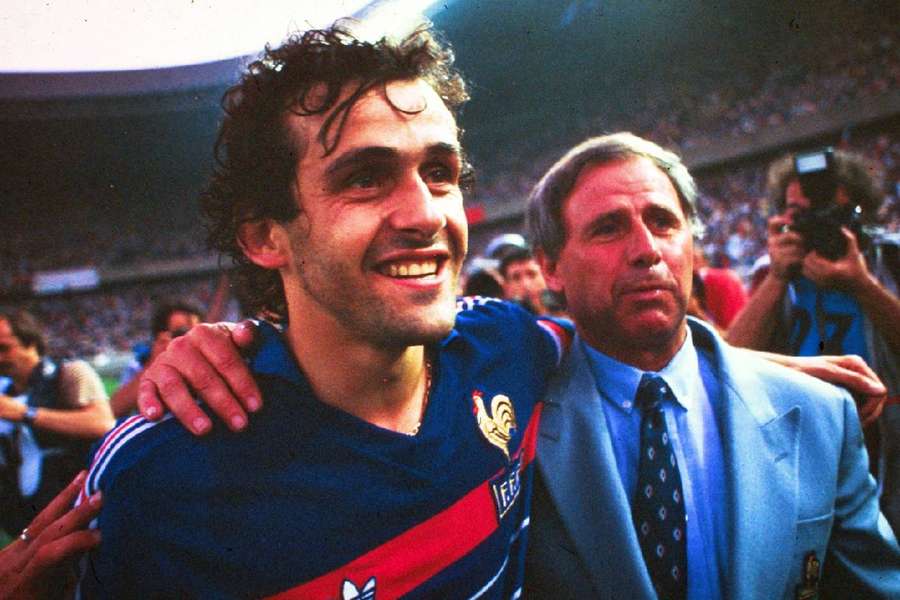After the 1980 edition was considered one of the dullest tournaments in history, with the winner-take-all group format leading to cautious football from the participants, UEFA decided a change was needed.
The top two teams in each group would meet in the semi-finals, with the third-place team being eliminated.
Although not considered a force in world football, with rather modest results in recent decades, France were to host the tournament, and they had one trump card up their sleeve: Michel Platini.
The Ballon d'Or in action
Platini had turned world football on its head with his art of ball control, which made him not only a genius passer but also a feared goalscorer.
In 1983 he won the Ballon d'Or receiving more votes than second, third, fourth and fifth places combined. Granted, at the time only European players were considered for the prestigious award, but with Diego Maradona not having a great time at Barcelona, it was hard to believe anyone else could have taken his crown even if the rules were different.
"Le Roi" ("The King") Platini had won the Cup Winners' Cup and the Serie A title before the start of Euro 84 and for the second year in a row (there would eventually be three) he was the top scorer in the Italian championship.
Under these circumstances, it was no surprise that France were considered the big favourites and they responded to the pressure.
Platini scored the first goal of the competition in an opening 1-0 win over Denmark, before scoring a hat-trick in each of his next two group games, against Belgium (5-0) and Yugoslavia (3-2), and to this day remains the only player to have achieved such a feat at a single Euro.
He finished the competition with nine goals in total, a record that still stands, with no other player having scored more than six in a single edition, although the number of matches has increased over the years.
For a long time, Platini was the all-time Euro goalscorer, eventually being dethroned by Cristiano Ronaldo, who now has 14, only the Portuguese has needed five editions to reach that level, while the Frenchman has only had one summer.
Historic success for France
The semi-final with Portugal was one of the most spectacular games ever seen at the Euros. A match in which chances abounded at both ends, but in which France were kept in the game by a defender - Jean-Francois Domergue - only for the same player to score late on and keep the tie alive.
When the game seemed to be heading for penalties, Platini was again decisive
He received a pass from Jean Tigana in the centre of the box and shot under the crossbar, over the goalkeeper and the three defenders on the goal line.
The final against Spain (the Iberians beat Denmark in the semi-finals on penalties) was a much closer affair. Platini opened the scoring with what is regarded as his ugliest goal of the finals, but it completed his impeccable run: goals scored in every Euro match. Bruno Bellone made it 2-0 in the last minute of play as France won their first major trophy.
"It was the first official trophy won by France in a team sport, so it was a great moment for French football and for French sport in general," Platini said after a final in which praise was pouring in, with the French nicknamed the 'Brazilians of Europe' who play 'champagne football'.
It was also a special moment for coach Michel Hidalgo, who was offered the French Minister of Sport post, an offer he turned down but later regretted.
"I missed a new adventure, another slice of life. I rejected an incredible offer. As a coach, I loved representing France, but I think the job of minister would have suited me," he told the daily Le Figaro in 2007.
Team of the Tournament:
Goalkeeper: Harald Schumacher (West Germany)
Fullbacks: Morten Olsen (Denmark), Joao Pinto (Portugal), Andreas Brehme (West Germany), Karlheinz Forster (West Germany)
Midfielders: Frank Arnesen (Denmark), Alain Giresse (France), Jean Tigana (France), Michel Platini (France), Fernando Chalana (Portugal)
Forward: Rudi Voller (West Germany)
